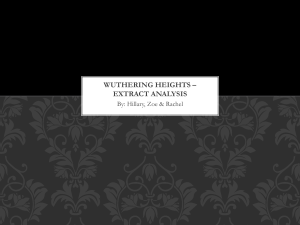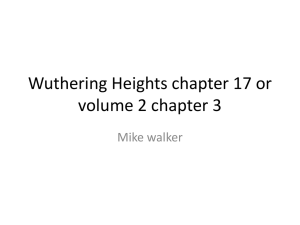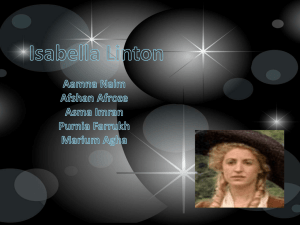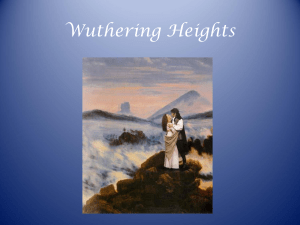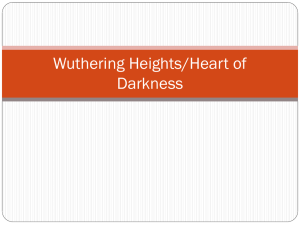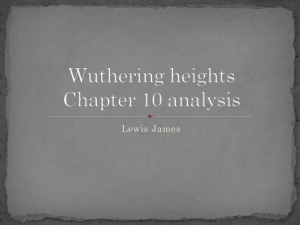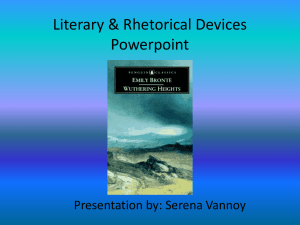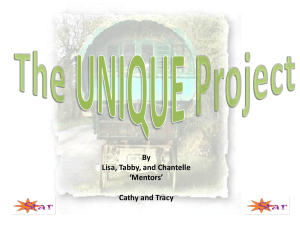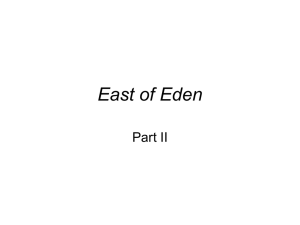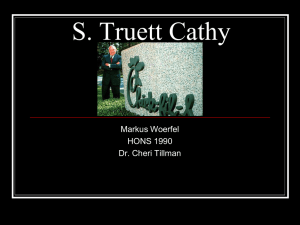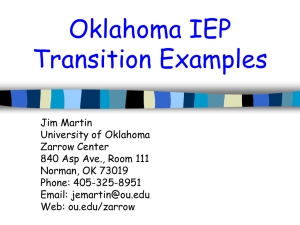Types of love that feature in Wuthering Heights
advertisement
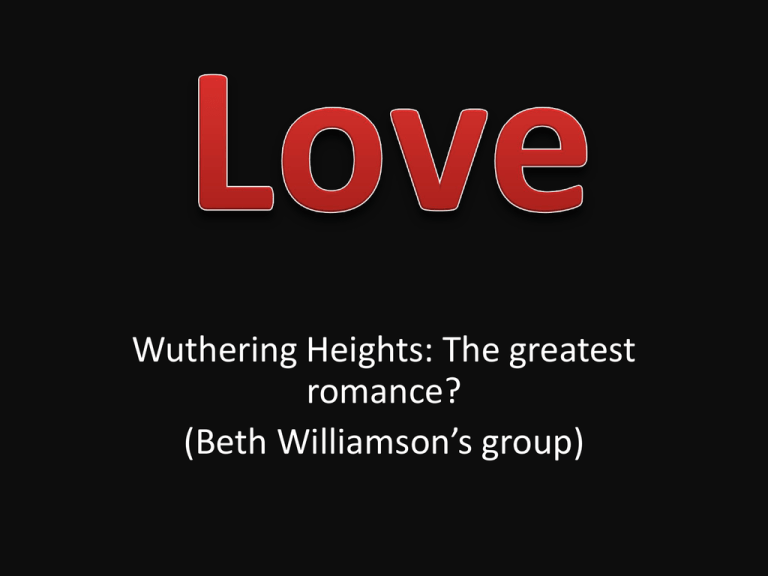
Wuthering Heights: The greatest romance? (Beth Williamson’s group) • For the purpose of this presentation Cathy will be the older Catherine, young Catherine's mother. • Catherine will be Cathy’s daughter. • Edgar Linton will be referred to as plainly Edgar. • Linton (Heathcliff’s son) will be Linton. There are many types of love that feature in Wuthering Heights and due to the gothic genre of the book these forms that love takes are not all conventional or straightforward. Forbidden – Heathcliff and Cathy. She states that it would “degrade” her to marry him. They cannot be together because of his lack of status. Compatibility – Heathcliff and Cathy are of natures which compliment each other. They are both wild and free spirits which cannot be tamed. Lasting – Hareton and Catherine. Longing/Desire – The relationship of Cathy and Heathcliff is never consummated meaning their desire for each other is never quenched. AbusiveIsabella and Heathcliff Care/Respect – Edgar wants this for him and Cathy and Hareton and Catherine have this type of love. Unrequited – Edgar and Passion – The passion between Heathcliff Cathy, although Cathy may and Cathy is what casts doubt over their have some feelings for relationship to critics. Possessive – Cathy and Heathcliff cannot Edgar she can never love bare to see each other with other people. him solely as he loves her. The ‘no’ argument is that what Cathy and Heathcliff experience is desire and lust, they are young and their relationship, if allowed to be together, would fizzle out eventually. This is because to some people love is not a whirlwind of passion but the ability for two people to share everything with each other and to have respect and a lasting ability. The yes argument is that love is as much about the passionate romance as it is the calm happiness which Edgar desires for him and Cathy (which would have been typical of the Victorian era). Those who strongly believe this is a story primarily about love would argue that everything which happens in the novel happens for love, however distorted this may become. When Heathcliff first enters the novel he is subjected to terrible bullying from Hindley and other children, he has no place in society and in a Victorian society, where appearance means everything, he is even outcast from the church. It is even suggested that he should be hung to prevent him from doing evil deeds in the future. However, Cathy is Heathcliff’s foundation to which he built himself upon. From a very young age Cathy’s love had been what had kept him from being alone. Everything he made himself was due to her and the plan he put together when he was younger, to become the owner of the Heights and the Grange so they could be together, even after her death, is continued. He fights for her love in every part of the novel, even when she chooses Edgar. He shows his respect for her when he hands her over to Edgar to protect her reputation and then waits all night, outside of the house, to receive news of her death. Just as Heathcliff doesn’t recognise Cathy as being married he almost doesn’t recognise her as being gone. Isabella Linton and Heathcliff – Isabella's love for Heathcliff develops when he is attempting to woo her, in order to provoke Cathy. Cathy’s obvious upset and the way in which she handles Heathcliff's attention towards Isabella, by taunting her, fuels Isabella’s hatred of Cathy and therefore makes her want to be happy with Heathcliff as a matter of revenge. However, she soon sees that Heathcliff does not love her and is ruined because of this. When Catherine first arrives a the Heights she does not like nor trust Hareton as she acts as though she is superior to him. However, she soon sees that he does in fact have feelings for her taking her part in augments with Heathcliff facing beatings because of it. Their love develops in the way we would expect conventional romance to develop as she teaches him to read and write, freeing him from the restrictions he has been subjected to under Heathcliff's guardianship. Edgar Linton, from the first moment he sees Cathy, is in love with her. To begin with his feelings are unrequited. However, towards the end of her part in the novel, as she falls pregnant, her heart is conflicted between Edgar and Heathcliff. It is as though she knows that society expects her to find a reputable and stable husband, which Heathcliff is not, she cannot deny her love for Heathcliff. ‘He got on to the bed, and wrenched open the lattice, bursting, as he pulled at it, into an uncontrollable passion of tears. ‘Come in! Come in!’ he sobbed. ‘Cathy, do come. Oh do – once more! Oh! My hearts darling, hear me this time – Catherine, at last!’ p28 P78-82: ‘I’ve no more business to marry Edgar Linton than I have to be in heaven;... So he shall never know how I love him; and that, not because he’s handsome, Nelly, but because he’s more myself that I am. Whatever our souls are made of, his and mine are the same, and Linton is as different as a moonbeam from lightening, or frost from fire.’ ‘if I marry Linton I can aid Heathcliff to rise, and place him out of my brother’s power.’ p82 ‘My great miseries in this world have been Heathcliff’s miseries...if all else perished and he remained, I should still continue to be; and, if all else remained, and he were annihilated, the Universe would turn into a mighty stranger... Nelly I am Heathcliff- he’s always, always in my mind- not as a pleasure any more than I am always a pleasure to myself- but, as my own being- so, don’t talk of out separation again-’ p82/83 P 114 Catherine locks Edgar and Heathcliff in the study together. Catherine to Edgar; ‘I wish Heathcliff may flog you sick.’ P 159 ‘He neither spoke, nor loosened his hold, for some five minutes, during which period he bestowed more kisses than he ever gave in his life before... I plainly saw that he could hardly bear, for downright agony, to look into her face!’ P160- P170 ‘I wish I could hold you,’ she continued, bitterly, ‘till we were both dead!’ p160 ‘I have not broken your heart – you have broken it – and in breaking it, you have broken mine.’ p163 ‘Do I want to live? What kind of living will it be when you – Oh God! Would you like to live with your soul in the grave?’ Heathcliff gives Cathy to Edgar; ‘...placing the lifeless looking form in his arms. ‘look there,’ he said, ‘unless you be a fiend, help her first – then you shall speak to me’ p164 ‘I shall not refuse to go out of doors,’ he answered; ‘but I shall stay in the garden’ p 165 ‘Be with me always – take any form – drive me mad! Only do not leave me in this abyss, where I cannot find you! Oh, God! It is inutterable! I cannot live without my life! I cannot live without my soul!’ – Heathcliff. p169 ‘He held a silent combat with his inward agony’ p168 ‘he was beyond my skill to quiet or control’ p169 Imagery is used in Wuthering Heights to present the love between Heathcliff and Cathy. The imagery is often violent and brutal but shows the couples true extreme feelings towards each other. When Heathcliff is not with her she often feels traps and acts as though she is consumed by something. When Cathy describes her feelings for Linton she often uses coldness and bareness in her words. ‘my love for Linton is like the foliage in the woods, time will change it, of that I am well aware, as winter changes the trees – my love for Heathcliff resembles the eternal rocks beneath – a source of little visible delight, but necessary.’ p82 When she describes Linton and herself as being as different as ‘a moonbeam from lightening’ and ‘frost from fire’ this shows this theory quite plainly. Cathy is hot tempered and fiery where is Linton is passive and calm. However, the lightening and fire are also more characteristically like Heathcliff. Language: •The language used by Heathcliff is often very untypical of the romance genre and is not what, as an audience, we would expect of the romance genre. Their words to each other are often very harsh and critical. ‘Is it not sufficient for your infernal selfishness, that while you are at peace, I shall still writhe in the torments of hell?’ p161 However this only further suggests that these characters are not restricted to a genre and that their feelings for each other go beyond what is normal or ‘socially acceptable’. Form: •The two main characters who are in love the novel, Cathy and Heathcliff, are different from typical Victorian characters. Their love is destructive and wild and uncontrolled. The characters therefore reflect the uneasy form which love can take. Structure: •The novel is palimpestic in nature in which the text has many hidden messages and assumptions must be made. Even though we must decipher what really has gone on with Cathy and Heathcliff as we read through the doubting eyes of Nelly Dean. Through the Deconstructivist approach we can see that each narrative is a commentary on the previous. In the chapter where Reader Nelly relays Cathy’s death for example the emotion is built up C from Nelly’s point of view of Heathcliff. This means that we are never allowed into the mind of that character so we can only imagine how they feel. This intrigues the reader and draws them into the relationship. Convoluted Chaotic Uncivilised Wild Excessive/Exaggerated The love is rarely ever straightforward in Wuthering Heights, the characters use convoluted methods to achieve their romantic aims such as jealousy. This results in chaotic resolutions in which the characters are often trapped in their decisions such as Isabella who decides to enter a relationship that she is aware is doomed. The excess and exaggeration is shown in all of Cathy and Heathcliff's actions as they take their emotions to extremes. Nelly often describes Cathy’s actions as being exaggerated, she says ‘proud people breed sad sorrows for themselves.’ Ornate Not just words to describe the landscapes but also to describe the love, the gestures are embellished with secret meaning and connotations, Catherine and Heathcliff are wild and uncivilised and many of the characters find it difficult to comprehend their emotions toward each other as it was not seen as ‘proper’ or ‘socially acceptable’. Fear Paranormal Threatening Fear is used within the love of Wuthering Heights, Cathy is terrified of losing Heathcliff and he is terrified of losing her. The description of the sound he makes when he loses her is haunting and typical of the genre; ‘lifting up his eyes, howled, not like a man, but like a savage beat getting goaded to death with knives and spears. The novel defies stable, prescriptive reading of the Victorian period. Novels such as Pride and Prejudice were typical of the romance genre and it is no wonder that this subversive novel didn’t reach critical acclaim until the 1920’s. Victorian literature was thought to have to address the capabilities of man. Wuthering Heights is almost the antithesis as it explores the weaknesses and struggles of man. The mass Victorian audience would not have understood how the expected hero, Heathcliff, is un-heroic, how we never access Heathcliff and Cathy's true thoughts and how Cathy can treat Edgar in the way she does and is allowed to do so. Their love contains no grace and elegance of Elizabeth and Darcy, instead it is tortured and heated. Heathcliff does not control his emotions, in fact his character works to show he is out of control. The love in the novel provides no redemption and where love is typically the making of the characters in this novel it is the destruction. Some points of comparison with the colour purple: •Celie finds herself through Shug Avery just as Cathy and Heathcliff define each other. •There are a lot of abusive relationships within ‘The Color Purple’ for example Sofia and Harpo, alike to that of Isabella and Heathcliff. •Love is used within ‘The Color Purple’ as a destructive force. Clearly within ‘Wuthering Heights’ love destroys many of the characters, Hindley and Heathcliff are examples of this. •Within ‘The Color Purple’ love is used in order to appeal to the audience and to make them want the central characters to find love. In ‘Wuthering Heights’ the audience wants Cathy and Heathcliff to be together but it is not possible. •In The Color Purple the love is presented in a transient way with the characters either not feeling strongly for the people their partners or with their relationships coming to an end. The relationships in ‘Wuthering Heights’ are ultimately eternal. •‘The Colour Purple’ lacks the longing and passion that ‘Wuthering Heights’ contains. (a) ‘Love is presented as the most powerful emotion of the characters.’ Explore the methods which writers use to present the theme of love. In your response, you should focus on Wuthering Heights to establish your argument and you should refer to the second text you have read to support and develop your line of argument. Or: (b) ‘The development of love is the main appeal of Wuthering Heights.’ Using Wuthering Heights page 78-83 ‘I’ve no more business to marry Edgar Linton than I have to be in heaven’ as your starting point and continue to Nelly I am Heathcliff- he’s always, always in my mind- not as a pleasure any more than I am always a pleasure to myself- but, as my own being- so, don’t talk of out separation again-’ In order to explore the ways in which writers create suspense. In your response, you should focus on Wuthering Heights to establish your argument and you should refer to the second text you have read to support and develop your line of argument.
